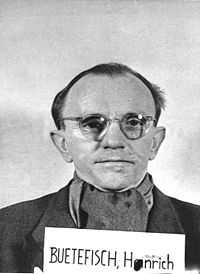Heinrich Bütefisch

Heinrich Bütefisch (24 February 1894, Hanover – 5 September 1969, Essen) was a German chemist, manager at IG Farben, and Nazi war criminal.[1]
As a leading figure in IG Farben, Bütefisch joined the Freunde des Reichsführer-SS, an exclusive group close to Heinrich Himmler whose membership allowed prominent individuals in German society to become effectively SS officers without undergoing rigorous selection or training.[2] He served as one of Nazi Germany's Wehrwirtschaftsführer (war economy leaders) and received the Knight's Cross of the War Merit Cross.[3]
During the Nuremberg trials, Bütefisch was convicted in 1948 as a war criminal[1] and sentenced to six years in prison. The reasons for the judgment contain the statement 'Die Ausbeutung der Arbeit von KZ-Insassen ist ein Verbrechen gegen die Menschlichkeit.' (the exploitation of concentration camp inmates is a crime against humanity).[3]
He served his sentence in Landsberg Prison and was released in 1951.
In 1952, Bütefisch became a member of the supervisory boards for Deutsche Gasolin AG, Feldmühle, and Papier- und Zellstoffwerke AG. He also became a consultant for Ruhrchemie AG Oberhausen, joining its supervisory board in 1952.
In 1964, he was awarded the Grand Cross of Merit of the Federal Republic of Germany (Großes Verdienstkreuz). Protests ensued, so much so that President Heinrich Lübke asked him to return the award.
Bütefisch died on 5 September 1969 in Essen.[4]
References
- ↑ 1.0 1.1 Dwork, Deborah; Pelt, Robert Jan (2002). Auschwitz. W. W. Norton & Company. p. 207. ISBN 0-393-32291-2. Retrieved 7 April 2011.
- ↑ G.S. Graber, History of the SS, Diamond Books, 1994, p. 73
- ↑ 3.0 3.1 spiegel.de 8. April 1964: Soll und Haben
- ↑ "Wollheim Memorial". wollheim-memorial.de. 2011. Retrieved 7 April 2011.
| ||||||||||||||||||||||||||||||||||||||||||